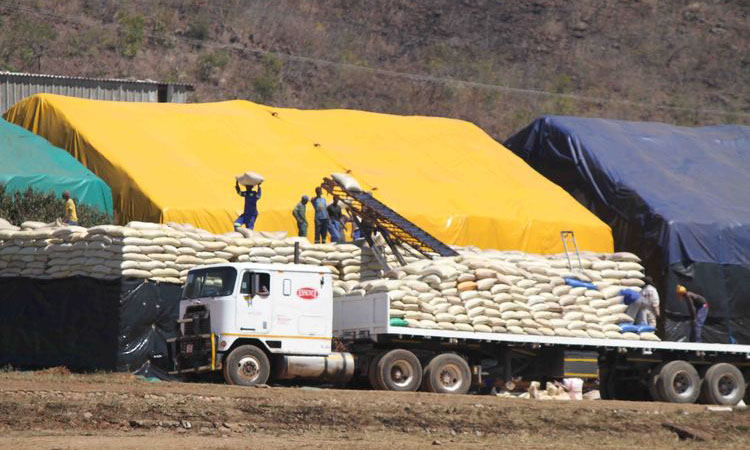
The ManicaPost

Samuel Kadungure Senior Reporter
As the country tirelessly works towards achieving food security and reversing the effects of the economic sanctions imposed on the country by the West, the climate-proofed Presidential inputs programme (Pfumvudza) has been embraced by communal farmers; with the training of farmers, digging of holes and gathering of mulch in full throttle.
In Manicaland, more than 50 percent of the beneficiaries are ready to plant with the first rains.
The Pfumvudza programme is one of the key points in the Agriculture Recovery Plan, a blueprint aimed at reversing declining production and productivity trends in the agricultural sector as well as bursting the economic sanctions imposed on the Southern African nation about two decades ago.
The programme will put agriculture on a firm foundation to contribute significantly to a pro-poor and inclusive economic growth trajectory, which is key to the attainment of Vision 2030.
At least $118 million is being mobilised to transport inputs under the climate-proofed Presidential inputs programme, commonly known as Pfumvudza, from the Grain Marketing Board (GMB) depots.
Government is meeting transport costs and distribution of inputs is expected to pick up in the next few days as the Ministry of Finance and Economic Development is working tirelessly to ensure farmers receive inputs on time.
Lands, Agriculture and Rural Resettlement Deputy Minister Douglas Karoro last week said Government will meet the costs of transporting inputs under Pfumvudza. Agronomists interviewed this week said there is a lot of excitement among small-holder farmers as the programme presents them with twin opportunities to access inputs and produce something from their plots regardless of the weather conditions.
Zimbabwe Farmers Union (ZFU) director, Mr Paul Zakariya, said the Government-sponsored programme was formulated to enhance and commercialise productivity in communal rain-fed areas by focusing on integrated farming, moisture conservation efficiency, soil health management and synergising resource conservation.
So far, over three million farmers have received training on the Pfumvudza farming concept, with the majority of them being women.
At a national level, the programme is targeting 1, 8 million households, with a target of 1,8 million tonnes of cereal and 360 000 tonnes of oil seed.
In Manicaland, the programme is targeting 250 000 households. More than 226 000 Manicaland farmers have already been trained on the new concept.
The province is targeting 220 000 hectares of maize and 100 000ha of small grains.
“There is a lot of excitement among small-holder farmers.
“The training and preparation of the fields started way back in June. To begin with, this is an opportunity for them to access inputs. Over and above that, the conservation agricultural concept will certainly boost their production and guarantee food insecurity.
“The weather-proofing ensures that no matter the weather condition, the farmers will still get good harvests,” said Mr Zakaria.
“For cereals, there are three plots per household for legumes and cash crops,” he said.
Livestock and rural development expert, Professor Joseph Kamuzhanje, said the Pfumvudza programme has come to the rescue of thousands of small-holder farmers whose cattle — which are used for draught power — had succumbed to drought and theilirolisis, among other diseases that continue to kill livestock in Manicaland.
Between January 2019 and June this year, Manicaland lost cattle with an estimated value of US$500 000 — with small-holder farmers accruing huge losses that compromised their tillage capacity.
Farmers without draught power muscle can still plant and produce, thanks to the Pfumvudza programme.
“Most communal farmers were affected by severe shortage of dipping chemicals, which led to livestock deaths due to theilirolisis.
“This means small-holder farmers were left with serious draught power challenges as most of their cattle were wiped out by the disease.
“In the midst of the livestock death shocks, the Pfumvudza programme came. One can still produce and enjoy decent meals without the use of draught power. Farmers can be food secure through this initiative and also boost their finances through selling the surplus,” said Pro Kamuzhanje.
Tobacco Farmers Union Trust president, Mr Victor Mariranyika, said about 95 percent of their members are ready to plant with the first rains.
He said the forecast of normal to above normal rains is a positive development.
“Around 95 percent of our rural tobacco farmers have embraced this initiative and we continue to encourage the remaining ones to take up this model to ensure household food security. The weather is generally pointing to a good cropping season and this presents a rare opportunity for farmers to intensify both tobacco and food production,” said Mr Mariranyika.
The Pfumvudza programme recently received a major boost in terms of extension services as the mobility of agricultural extension officers has been enhanced through the 5 000 motorcycles availed by President Emmerson Mnangagwa.



